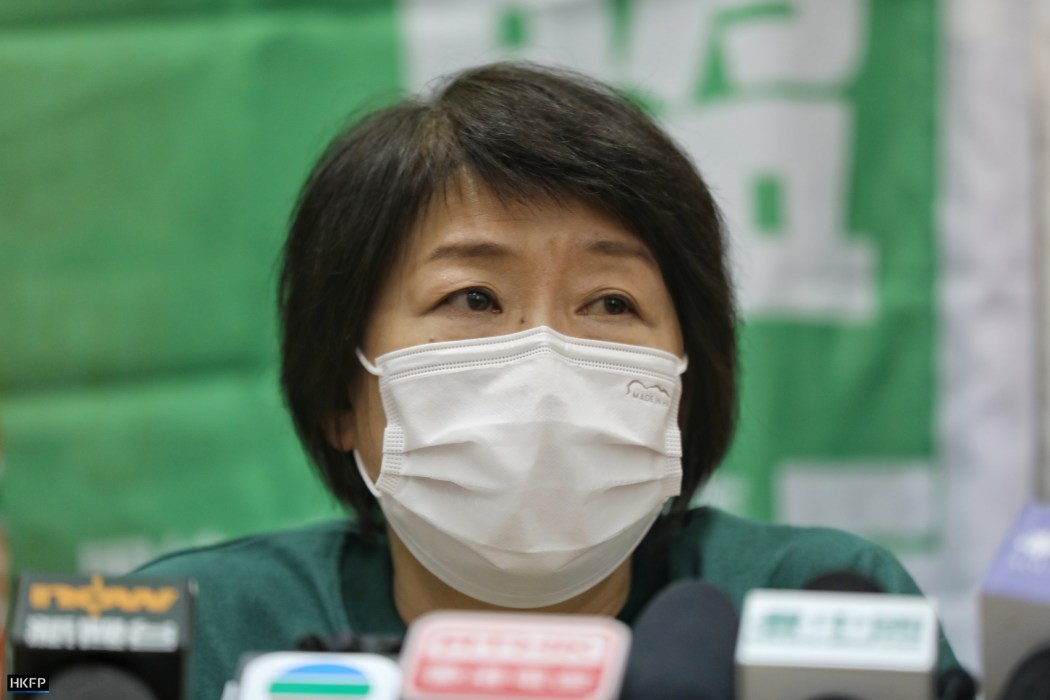The sister of former Hong Kong labour activist Elizabeth Tang has been jailed for six months, after she pleaded guilty to removing electronic devices from Tang’s home following her arrest under the Beijing-imposed national security law.

Magistrate Tsang Hing-tung put Marilyn Tang behind bars on Thursday morning, around two weeks after the 63-year-old admitted attempting to pervert the course of justice by taking away potential evidence in a national security case involving her sister Elizabeth Tang.
Elizabeth Tang, former chief executive of the now-disbanded Hong Kong Confederation of Trade Unions, is the wife of jailed pro-democracy activist Lee Cheuk-yan. She was detained by national security police on March 9 outside the prison where Lee was held on suspicion of colluding with foreign forces.
Marilyn Tang and Frederick Ho, a lawyer assisting Elizabeth Tang, were later arrested for allegedly obstructing police investigations by removing evidence from Tang’s home before the force obtained a search warrant.
According to case details unveiled earlier, Marilyn Tang was said to have entered her sister’s home twice before police conducted a search. She took away her sister’s mobile phone and laptop, the court heard.
Elizabeth Tang, who has been granted bail, was accused of colluding with foreign forces but has not been formally charged.
In sentencing Marilyn Tang at the West Kowloon Magistrates’ Courts, Magistrate Tsang said imprisonment was unavoidable as the case was “not minor.” There was no evidence to show that the defendant had opened, interfered with or damaged the mobile phone and laptop, and the devices did not contain information related to Elizabeth Tang’s alleged crime, the magistrate ruled.

“It had no impact on the charges concerning her sister,” Tsang said in Cantonese.
Considering Marilyn Tang’s active participation in community work and her good behaviour, Tsang said he believed the current case was a “one-off” offence and her chance of re-offending was low.
Tsang set the starting point of sentencing at nine months of imprisonment and gave the defendant a three-month reduction taking into account her guilty plea.
Tang smiled and nodded at her family and friends in the public gallery after her sentence was handed down. She also made a fist gesture, while some people chanted “add oil,” a Cantonese phrase expressing encouragement, when Tang was led away by corrections officers.
Beijing inserted national security legislation directly into Hong Kong’s mini-constitution in June 2020 following a year of pro-democracy protests and unrest. It criminalised subversion, secession, collusion with foreign forces and terrorist acts – broadly defined to include disruption to transport and other infrastructure. The move gave police sweeping new powers and led to hundreds of arrests amid new legal precedents, while dozens of civil society groups disappeared. The authorities say it restored stability and peace to the city, rejecting criticism from trade partners, the UN and NGOs.
Support HKFP | Policies & Ethics | Error/typo? | Contact Us | Newsletter | Transparency & Annual Report | Apps
Help safeguard press freedom & keep HKFP free for all readers by supporting our team
























